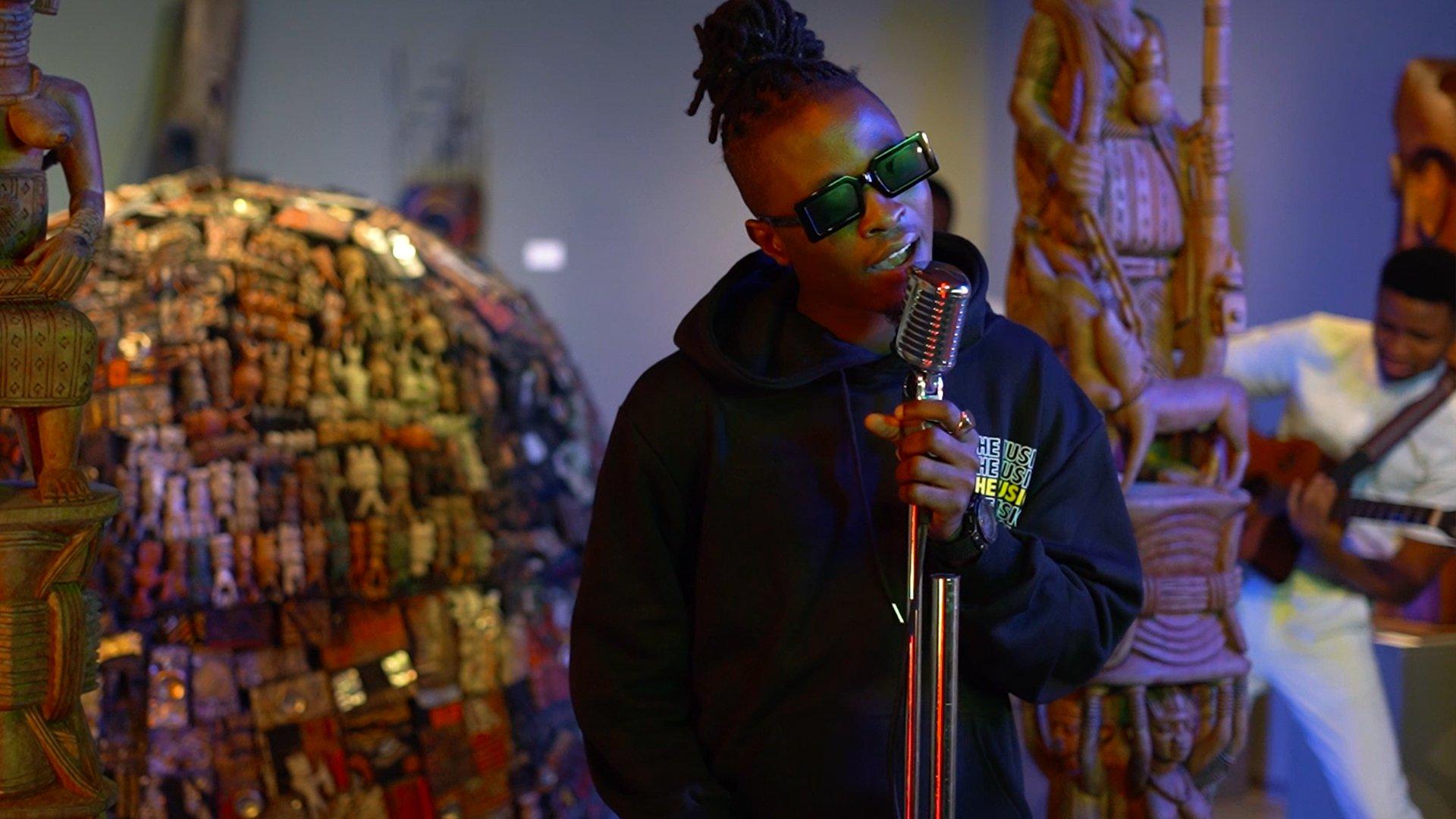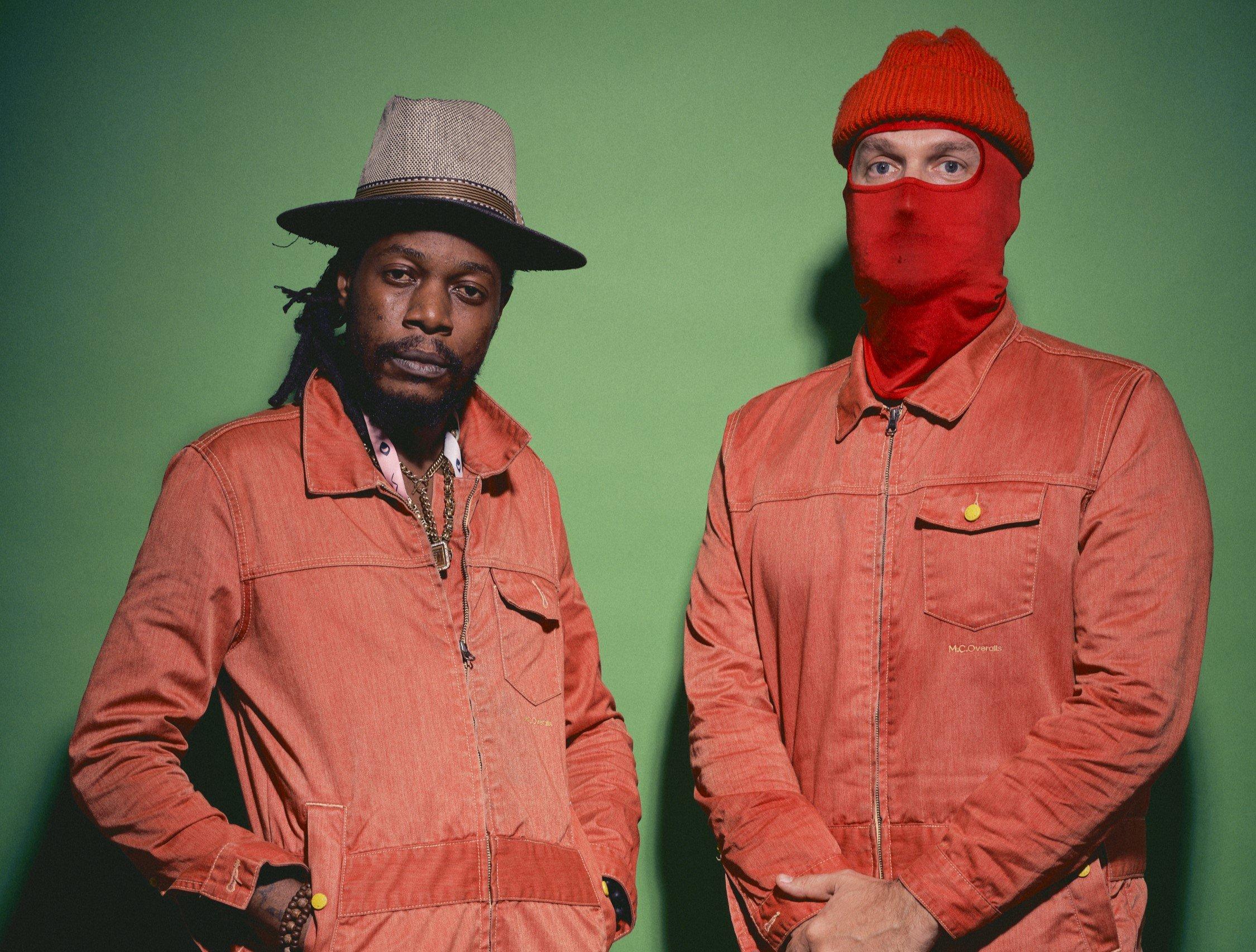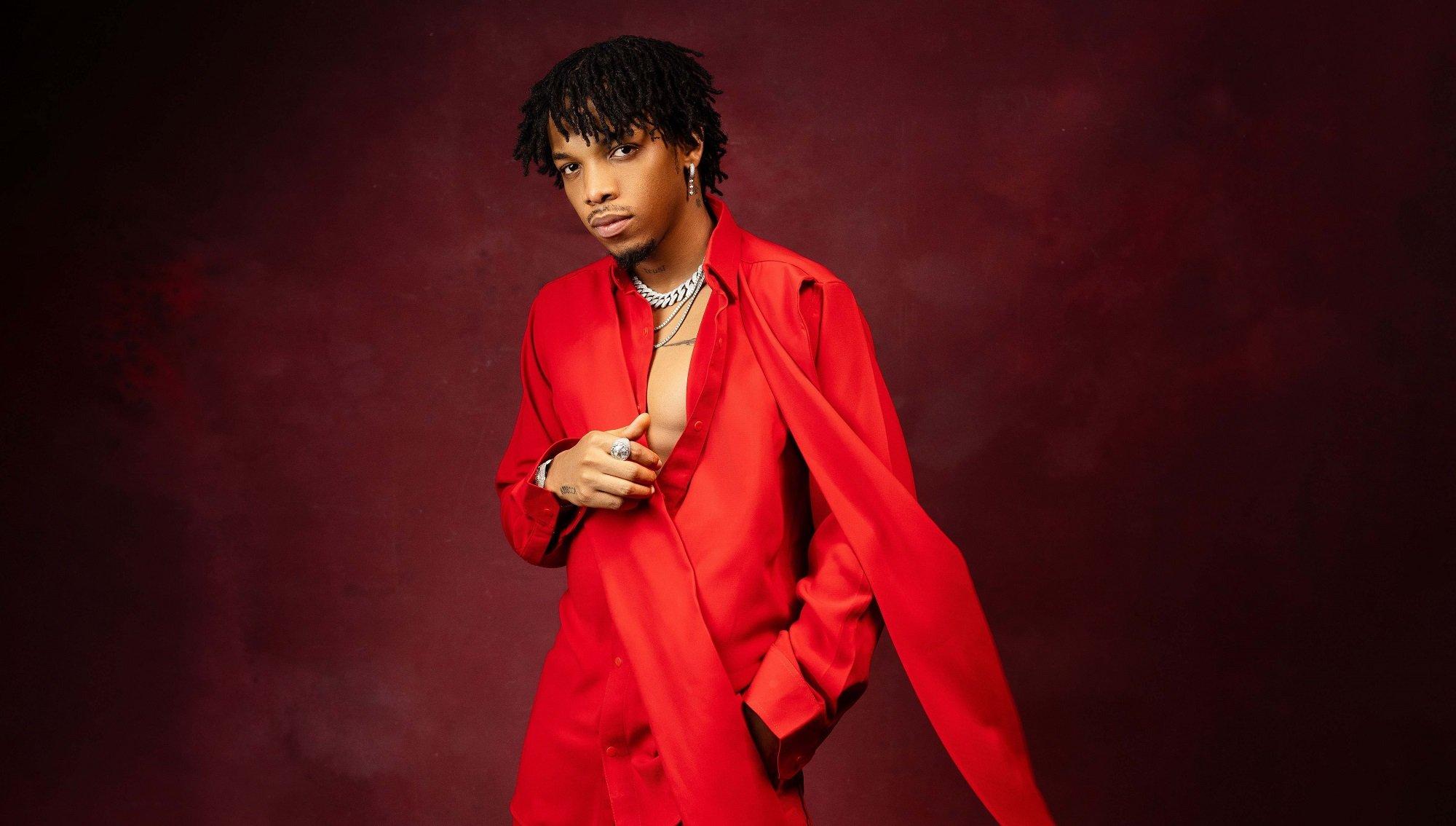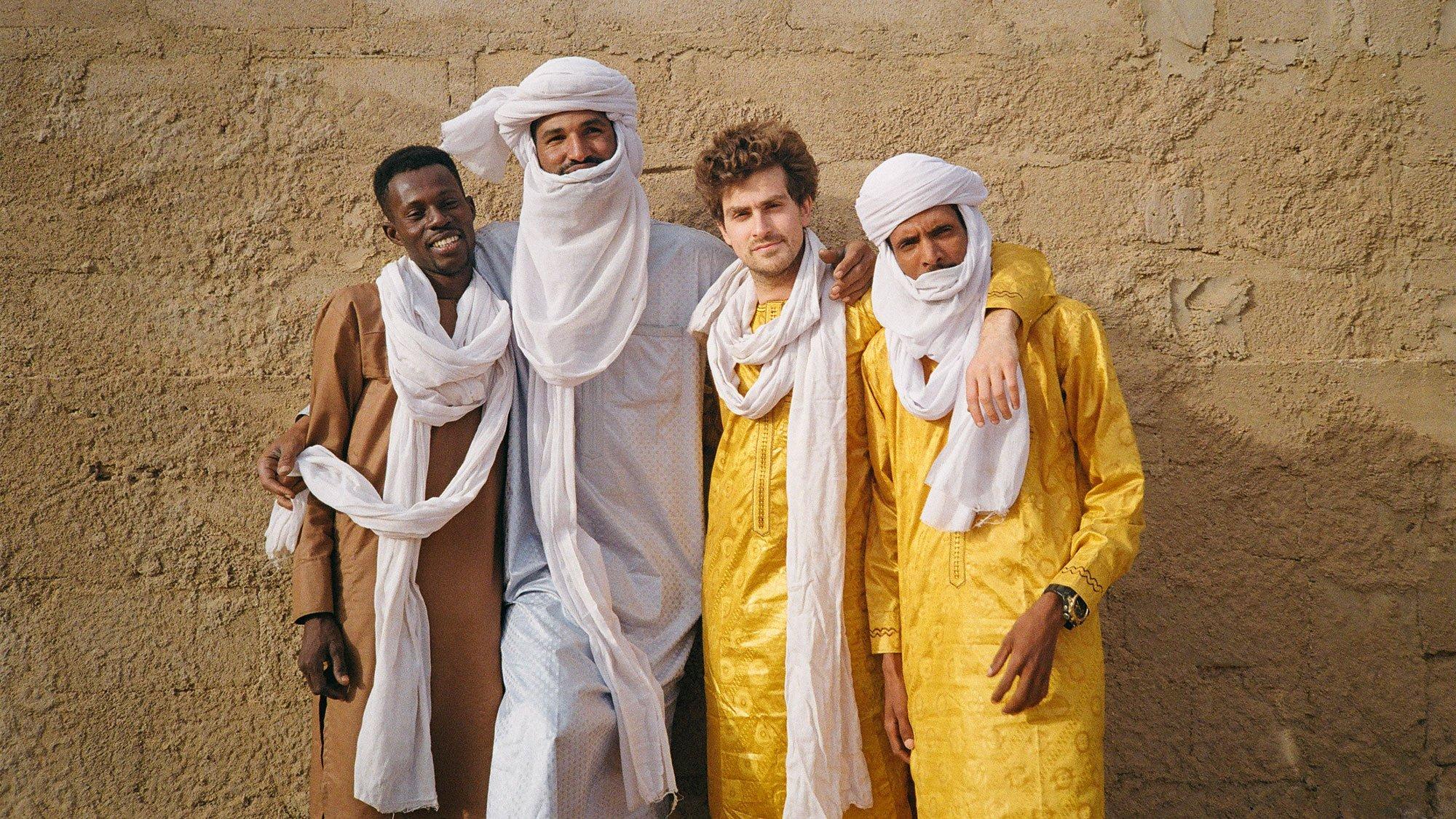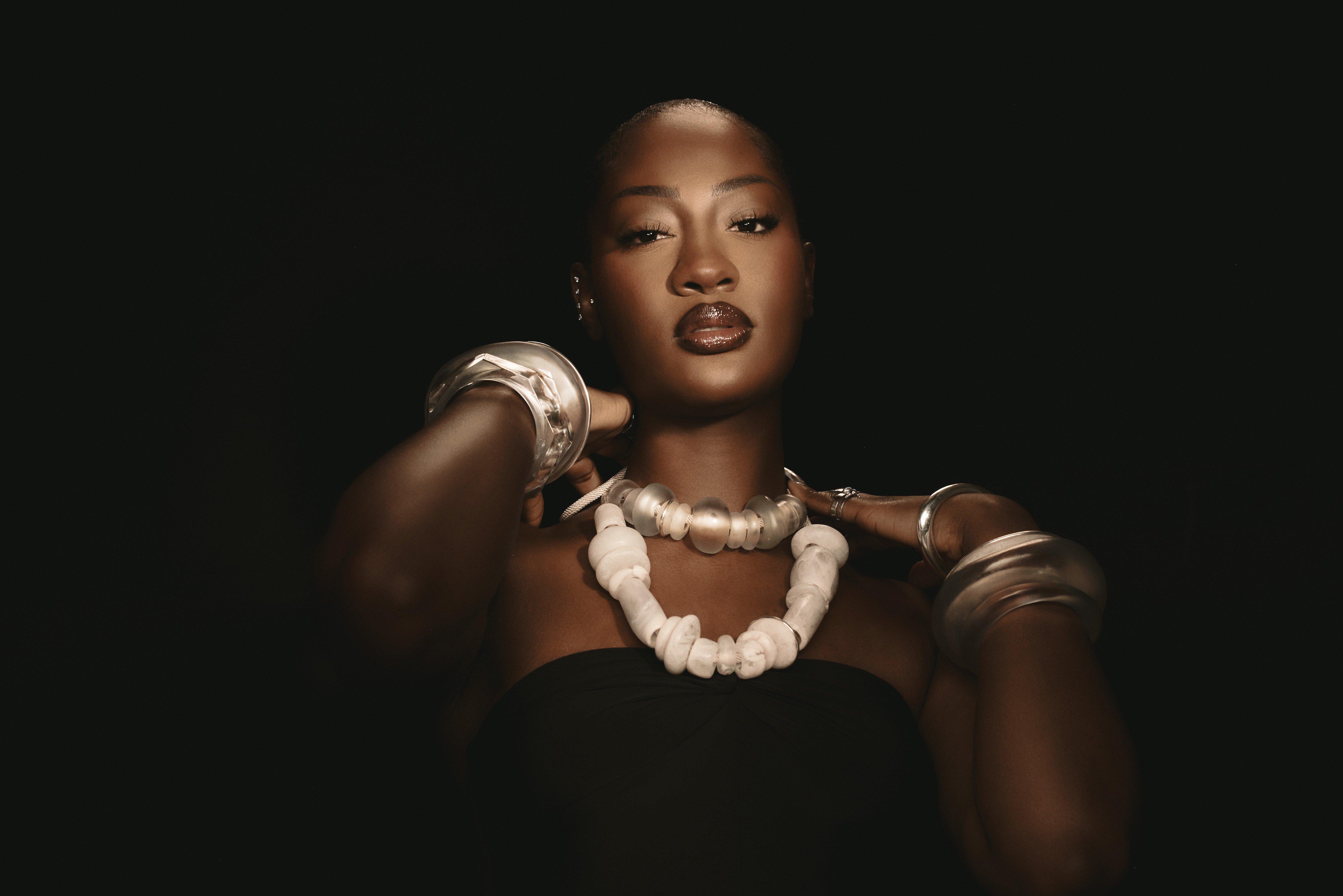No one else sounds like KOKOKO! — they are a truly unique aural experience, an emphatic statement that does justice to the exclamation point in their name.
The experimental live electronic group out of Kinshasa — the active, populous capital of the Democratic Republic of Congo — is a reflection of their city. Their shouted and chanted lyrics reflect people's frustration with their government, as well as the sonic signals of industrious local vendors. Even their DIY instruments are an example of their resourcefulness: Although DRC is a resource-rich country, that wealth has been extracted by and for Western powers for centuries. Locals are left with limited resources and experience regular power outages and intense, ongoing conflict.
KOKOKO! was born after French electronic producer Xavier Thomas — who makes left-field, globally-influenced electronic music as Débruit — met talented local singer and musician Makara Bianko on a visit to Kinshasa. He was captivated by Bianko's large, nearly daily outdoor performances with his massive dance crew. The group, which also consists of locals Boms and Dido who fashion DIY instruments, incorporate much of Makara's improvisational and interdisciplinary energy into their music and energetic live show, while Thomas brings in synths, drum machines and other electronic elements.
After releasing their powerful debut album Fongola in 2019 on indie label Transgressive Records, KOKOKO! started getting booked at music festivals around the globe, as well as on NPR's Tiny Desk series and Boiler Room. Now, the cutting-edge group is pumping up the BPM and bringing the lively Kinshasa nighttime to the rest of the world via their urgent, high-energy sophomore album, BUTU, on July 5 on Transgressive.
Read on for a chat with Thomas and Bianko about their captivating new album, the music scene in the Congo, how their music reflects Kinshasa, and much more. (Editor's note: Bianko's answers are translated and paraphrased from French by Thomas.)
What energies, sounds and themes are you harnessing on 'BUTU?'
Xavier Thomas: "Butu" means night in Lingala [one of the national languages of the DRC]. The album is all about that high energy, specific atmosphere that happens when the night falls in Kinshasa.
It's a very loud and crowded city. It gets pitch-black quite quickly because it's on the Equator. The sun sets really fast all year long. The sounds of the city kind of wake up [at night]; the generators are plugged in and the club music and evangelical church music [start] competing. All the inspirations are from all these sounds and everything that happens in the night in Kinshasa.
The band plays a lot of DIY instruments; what instruments are on this album and can you point to their specific sounds?
Xavier Thomas: There're the go-to things and then there's the found objects or the ones you can build. Simple things that are kind of ready-made, like detergent bottles — you can play it with a stick with a little bit of rubber, and it kind of makes bongo sounds with a slight natural overdrive.
And you can also build your own string instruments with what you found on the street. For example, there's plastic chairs that have metal feet, and you can do a kind of metallophone with; if you chop the tubes, you will get different pitches, etcetera. You can find something in a mechanic shop that sounds really good straight away when you hit it; metallic percussion. So that's all the different DIY instruments or found percussion that you can make or work with.
Was it mostly the same instruments as the first album, or were there some different things you were incorporating as well?
Xavier Thomas: There are different things. Also, on this one, we use a little bit more of electronics, as it's a bit more upbeat and influenced by the club and the small music production studios of Kinshasa.
There are also some field recordings. For example, on some tracks, there's horns from moto taxis that we pitched and made melodies with. But yeah, it's roughly the same instruments.
The term DIY is often attached to the band. Of course, you just talked about the instruments, but I was also curious what DIY and improvisation looks like in your music-making process and performances.
Xavier Thomas: It was an all-over DIY thing when we started. I used to make a lot of the videos. We [still] work with a small team, so we always have problems getting visas. We're doing a bit of everything just to keep going forward and traveling and to get our music everywhere. So, the DIY is not just the music, it's [all very] hands-on. Even on stage, we don't turn up with a big team, it's pretty much us at the moment.
The DIY aspect came out of necessity for the music and instrument creators, of not being able to afford to buy or rent an instrument. So it started like that, trying to make a one- or two-string guitar, a two-string bass, and a drum set. And then it went beyond that, realizing we can find original and new sounds if we're not copying existing instruments.
When I met Makara, he was doing five-hour public rehearsals six times a week on his own with 40 or 50 dancers. He had to work out all the technical problems with power cuts and amplifiers exploding. Makara still has that energy, even when we're sound checking. A lot of that DIY intuition is still coming in.
The recording process has to be DIY because you're recording in outside music studios in little compounds or in difficult neighborhoods of Kinshasa, so there's a lot of sounds in the background. You just grab the moment where the energy, the music, the inspiration feels right. That's another DIY part of the project, it's pretty much recorded outside of recording studios for the most part.
How does that also speak to access to instruments, internet and music studios for music-making in the DRC more broadly?
Xavier Thomas: Well, there's some big artists in the Congo that have a lot of money and travel to play even in the U.S. and France. A few artists have everything they want and they're very famous and wealthy. But most of the studios I've seen are a tiny room in the corner of a compound, yet people are doing the most impressive productions and recordings with very little, whether it's electronic or live music. It's very resourceful and sometimes you don't hear it, you could not imagine it would be coming from such a small studio.
I wish I could ask about every song on the album, because it feels like there's so much energy and context in each one. Can you tell me about the opening track, "Butu Ezo Ya" — the energy starts out so strong. Is there a message behind that song?
Xavier Thomas: The first track is kind of an invitation. It's saying the night's coming, be ready. We have all the sounds that we grabbed in the streets. That's the track where the horns of the motorbikes are pitched and turned into melodies. It's an invocation, an invitation, to the listener to step in the Kinshasa night because it's really something.
We wanted the opening track to be a little bit overstimulating, which is the impression you have the first time you step into the night in Kinshasa. So that's the idea, to [channel the] overwhelming street sounds that suddenly from chaos become organized and become the opener of the album to invite you to the more organized music after. [Chuckles.]
Makara Bianko: I'm inviting people to step into the night, step into the album.
The album's next track, "Bazo Banga," is really captivating as well.
Xavier Thomas: "Bazo Banga" means they are scared. Sometimes people chant it when they're protesting. It can also be used in sport events about the other teams. There's a lot of frustrations in Congo; the population is a bit abandoned by the government. Sometimes there are political things that can't be said or expressed because it's a bit dangerous. So, in this track — Makara has explained the lyrics to me before — it's a way to regain a bit of control by trying to impress the other side.
Makara Bianko: There's another angle mentioned at the end of the track: We're bringing so many new sounds that their hips are not going to hold. They are scared they are out of date, that they will not be matching our energy or be able to move because we're going too fast. During the track, I'm quoting a lot of images of why they could be scared.
Xavier Thomas: In Kinshasa, our sound is still very different. At the beginning, with all the music, art performers, people who do body performance as well, who gravitate around our music and are sometimes part of the videos; [other] people thought we were all so crazy. The music didn't fit any standards there, even though Makara has a lot of influences, more when he was younger, in more standard music like Congolese rumba or ndombolo. I think people can still be a bit scared of our style and our energy, the people we work with, it's a bit different.
In what ways is your music incorporating — as well as radically shifting — traditional and popular Congolese music?
Makara Bianko: Growing up in Kinshasa, there's a lot of Congolese rumba and nbombolo. I'm also influenced by [Congolese] folk music, really old rhythms and chants. Congo is so big that this has just been mixed in our music, but we are presenting it like it's a new recipe. It doesn't taste like what you're used to even though the ingredients are there. There's also influences [in our music] from outside countries like Angola or South Africa.
Xavier Thomas: What struck me the most when I first met Makara at this concert — from my Occidental angle — he has a very punk energy. Even though people aren't listening to punk music in Kinshasa, Makara would stick his mic in the speakers and play with feedback, and he has a very powerful voice and sometimes a very threatening singing tone. It was not influenced from punk; it was his own energy, his own frustration.
I think music helps express the frustration a lot of people have in Congo, and people see that in him, through his anger and when he talks about things people encounter on the street that they can relate to. So yeah, some of the old folk music is there as influences, but it's very important to him to not do the same thing that a lot of artists have done for the last 40 years and to bring something new.
What's going on in Kinshasa and the DRC in terms of electronic music? Are there other DIY electronic acts coming up?
Xavier Thomas: There's a lot of electronic music now, I think the big scenes are in South Africa or Nigeria for big pop electronic music. Congo used to influence a lot of West Africa and Central Africa and now Nigeria and South Africa have quite strong industries, so sometimes there's a bit of that influence.
With more Congolese rhythms for electronic music, you can have the whole range from very pop to very alternative. In the neighborhood where we started, there's a few more bands coming up now with DIY instruments who play a bit more like folk music from the Equator region in the north of the country. In Europe, I've noticed three bands since we started that now work with more DIY instruments. There's a music producer, P2N, from the southeast of Congo who makes repetitive electronic music in a kind of hypnotic, dance way.
The band has been touring quite a bit since the first album. Locally, are you an active part of a scene, or is it more like you're doing something different there and bringing that around the world?
Xavier Thomas: We're still quite unique in Kinshasa, and if we play there it would be more of a block party. Makara has a lot of dancers in his crew, and dancers would join from the youngest at the beginning [of the show] to the more experienced, bridging between classic Congolese dance and more contemporary dance. There's a lot of theater in the dance as well.
When we play there, it's still alternative. Once in a while we might play a bigger stage, but we play out [of the country] way more in front of way more people. We try not to play too often [here]. It's a huge city, so it can be tricky with the power cuts and everything. It's more of the art scene and people from the performance art school and dancers who gather if we do an event in Kinshasa, it's not huge crowds.
You've performed on some pretty big platforms, as well as at global music festivals. What goes into your energetic live performance; is there improvisation?
Xavier Thomas: It's key that we are still incredibly passionate, and we feel the music and leave a lot of space for improvisation. Then we can surprise each other, even during a gig. One track can be one length or double the next time, depending on the feeling, the crowd, the sound system and the time we play.
Usually, people end up really moving, sometimes without realizing. We don't spare any energy. You end up drenched in sweat. I think because our excitement is real, the music is not over-rehearsed. We're still always excited at every show. I think people can feel that it's not staged. There can be unexpected things happening, which keeps us energetic, motivated and surprised on stage.
How does the band usually feel after a performance? Is it a cathartic experience?
Xavier Thomas: Well, we have our kind of ceremonial thing. We usually talk together at the beginning; we gather and stick our heads together, and we say where we are and what we want to achieve. At the end of the concert, the whole hour or so feels like it's passed by really quick, and you're still left with that rhythm or energy, even though you might be super tired, sometimes traveling and playing every day. Sometimes we have more energy at the end. At the beginning, we feel tired, and then the energy really comes in, and we feel super energized and super sharp and really awake at the end. It's good for us.
What does Kinshasa sound like to you?
Xavier Thomas: For Makara and I, to explain to somebody who's never been to Kinshasa, it's a very sonic city. I've never seen [anything like it]. It's so crowded; I think it's 15 million or 18 million people now. [Editor's note: 17 million is the latest estimate.] Everybody lives on the ground floor. There aren't too many high buildings, so the density of people is very high. For this reason, it's visually a bit crowded and overwhelming with people, cars, colors and everything.
Therefore, to be noticed or stand out, everybody needs to have their own little signal or jingle. You can tell who's around you with eyes closed. A nail polish vendor would just bang two little glass polish bottles; that sound carries far away and they have their rhythm. People who sell SIM cards have a loop on their megaphone.
Sound is how to be noticed; how to sell yourself, what's your role, what's your identity. That's obviously, without talking about music and sound systems. Churches have their own huge sound systems and they can clash with the club in front. Also something very typical in Kinshasa; it goes to the fullest, to the max, everything is used at its highest potential. The sound is pushed in overdrive and distorted because you want to be louder than the next person. It's all these little sound signals that can tell exactly who's around you or sometimes where you are as well. For me, that's the sound, plus the traffic.
Wow. It must be so different going somewhere more remote, or just where it's quieter. It must feel almost like something's wrong.
Xavier Thomas: There's not many moments with silence because at night the city is still alive. People like to go out. You can have a church next to you with a full live band and a huge PA sound system at 3 a.m. Quiet moments are rare.
Makara: It's hard to deal with silence. I don't feel comfortable in silence because I've never really experienced it.

